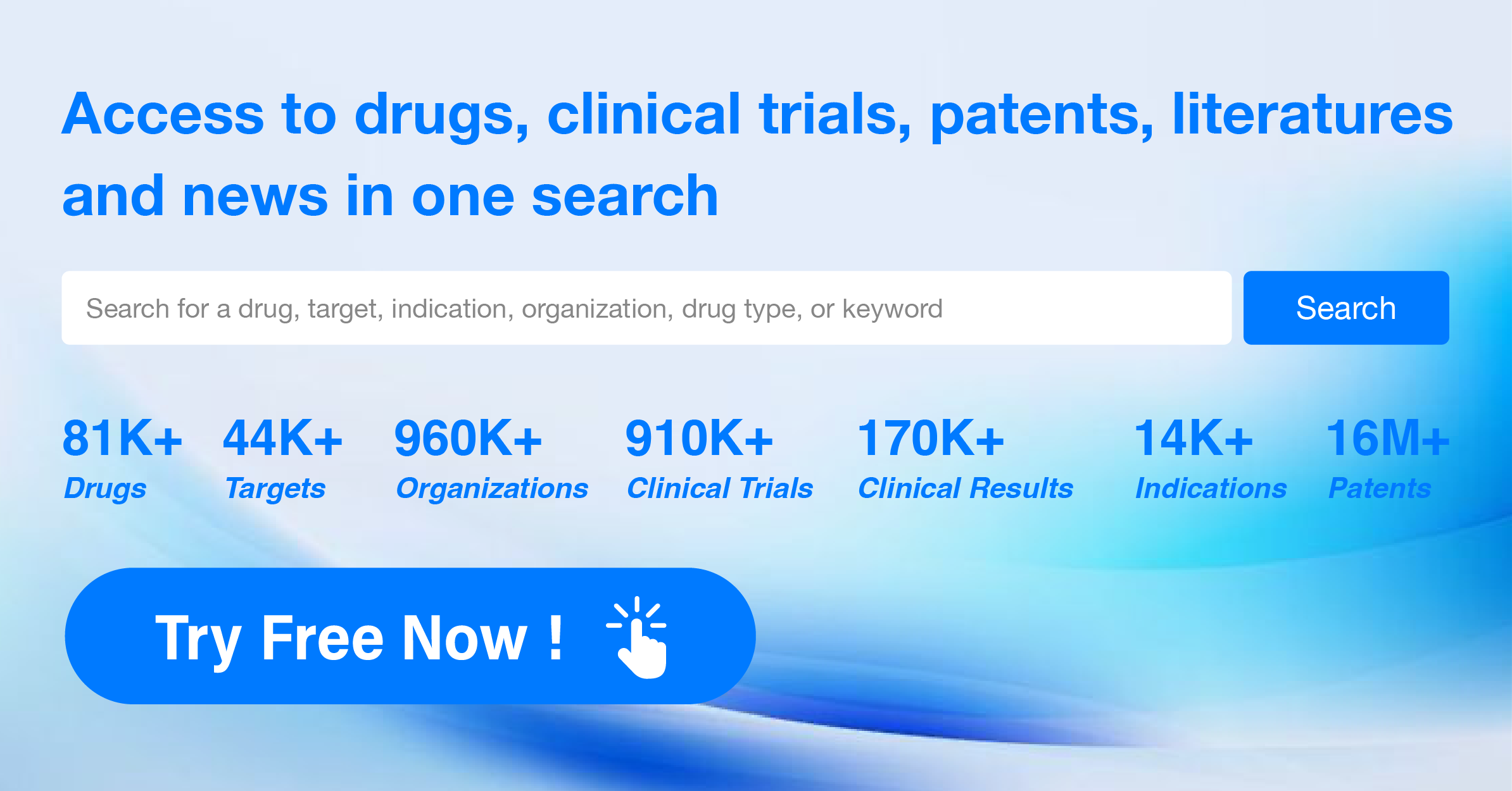Pharma Frontiers: Daily Digest of Global Pharmaceutical News - April 20
1.Roche's Precision Small-Molecule Cancer Therapy ALK Inhibitor Alecensa Receives Additional FDA Approval
On April 19th, Genentech, a member of the Roche Group, announced that the U.S. Food and Drug Administration (FDA) has approved Alecensa (alectinib) as adjuvant therapy following surgical tumor removal for the treatment of ALK-positive non-small cell lung cancer (NSCLC) patients with tumors measuring ≥4 cm in diameter or with positive lymph nodes. The press release noted that Alecensa is the first ALK inhibitor approved for the treatment of early-stage ALK patients following surgical tumor resection. This approval is based on the positive results of the phase III clinical trial ALINA, which showed that, compared to platinum-based adjuvant chemotherapy, Alecensa reduced the risk of disease recurrence or death by 76% (HR=0.24, 95% CI: 0.13-0.43, p<0.0001) in patients with completely resected IB (tumor diameter ≥4 cm) to IIIA stage ALK-positive NSCLC. An exploratory analysis observed an improvement in central nervous system (CNS) disease-free survival (DFS) (HR=0.22, 95% CI: 0.08-0.58). In this trial, the safety and tolerability profile of Alecensa was consistent with previous trials in metastatic cancer, with no unexpected safety issues observed. These data were published in The New England Journal of Medicine in April 2024. Alecensa, an ALK inhibitor, has been approved as both first-line and second-line treatment for patients with ALK-positive metastatic NSCLC. It has shown significant efficacy in patients, including those with CNS metastases, and now with this approval, these benefits can be extended to patients with early-stage disease.
2.Chia Tai Tianqing Pharmaceutical's JAK/ROCK inhibitor achieves key clinical primary endpoints, plans to file for marketing authorization
On April 19, Chia Tai Tianqing Pharmaceutical announced that its class 1 innovative drug, the JAK/ROCK inhibitor rovadicitinib (TQ05105) tablets, for the treatment of intermediate-to-high risk myelofibrosis (MF), has achieved the main endpoint in critical registration clinical trials. Chia Tai Tianqing Pharmaceutical has received the agreement from the Center for Drug Evaluation (CDE) under the National Medical Products Administration of China to submit a market application for the product and will soon file this application for marketing authorization. According to the press release from Chia Tai Tianqing Pharmaceutical, rovadicitinib is a JAK/ROCK inhibitor with an innovative chemical structure. In vitro tests have shown that the product can effectively inhibit the activity of the JAK kinase family and ROCK kinase, reduce the phosphorylation levels of STAT3 and STAT5 in cells, thereby inhibiting the transmission of the JAK/STAT signaling pathway and exerting anti-cancer activity. Chia Tai Tianqing Pharmaceutical announced data from phase 1 clinical studies of rovadicitinib for the treatment of myeloproliferative neoplasms (MPN) at the 2023 American Society of Hematology (ASH) annual meeting. The results showed that the product has favorable pharmacokinetic behavior in humans, the adverse reactions are tolerable, the best spleen reduction rate is 63.79%, and the best improvement rate of constitutional symptoms is 87.50%, with the potential to provide more clinical options for MF patients. Furthermore, Chia Tai Tianqing Pharmaceutical presented data from the phase 1b/2 clinical study of rovadicitinib for chronic graft-versus-host disease (cGVHD) at the 2023 European Hematology Association (EHA) annual meeting. The results indicated that rovadicitinib has tolerable toxicity in patients with cGVHD, with a best objective response rate of 86.7% across various graft sites, 40% of patients showing an improvement of ≥7 points in the LSS score, and 73.3% of patients reducing the dose of steroids used, offering a promising clinical treatment option for patients with cGVHD.
3. AbbVie's JAK inhibitor Rinvoq shows positive results in Phase III clinical trial
On April 19, AbbVie Inc. announced positive top-line results from the Phase 3 clinical trial, SELECT-GCA, for its JAK inhibitor Rinvoq (upadacitinib). In the trial, Rinvoq, in combination with a 26-week corticosteroid taper regimen, achieved the primary endpoint of sustained remission from week 12 through week 52 in adult patients with Giant Cell Arteritis (GCA). In the study, 46% of patients treated with the Rinvoq and steroid taper regimen reached sustained remission, compared to 29% of those treated with a placebo plus a 52-week steroid taper regimen (p=0.0019). GCA is an autoimmune disease that causes inflammation of the temporal arteries and other intracranial arteries, the aorta, and other large and medium-sized arteries. GCA typically affects individuals over the age of 50, with the most common age range between 70 and 80 years. The study also met key secondary endpoints, including a higher proportion of patients treated with the Rinvoq combination achieving sustained complete remission from week 12 to week 52 compared to patients in the control group (37% vs. 16%; p<0.0001). Over the 52-week placebo-controlled period, the safety profile of Rinvoq was generally consistent with that observed in its approved indications. The drug was well-tolerated in patients with GCA with no new safety signals identified. Complete results from all treatment groups in the SELECT-GCA study will be presented at future medical meetings. Rinvoq was discovered and developed by scientists at AbbVie and is a JAK inhibitor used to treat multiple immune-mediated inflammatory diseases. According to enzymatic and cellular analyses, Rinvoq has greater inhibitory potency for JAK1 than for JAK2, JAK3, and TYK2.
4.AbbVie Acquires Small Molecule Therapy Tavapadon as Key Phase 3 Trial Meets Primary Endpoint
On April 19th, Cerevel Therapeutics announced positive top-line results from its pivotal Phase 3 trial TEMPO-3. The analysis demonstrated that the trial met its primary endpoint, confirming the efficacy of the investigational small molecule drug tavapadon as an adjunctive treatment to levodopa (LD) in improving motor symptoms in patients with Parkinson's disease (PD). These trial results will be used to support the regulatory filing for tavapadon. Additionally, top-line results from two Phase 3 trials, TEMPO-1 and TEMPO-2, evaluating tavapadon as monotherapy in patients with Parkinson’s disease are expected to be released in the second half of 2024. According to the press release, tavapadon is the first selective D1/D5 receptor partial agonist reviewed for the treatment of Parkinson's disease. In December of the previous year, AbbVie reached a definitive acquisition agreement with Cerevel, through which AbbVie would acquire several therapies, including tavapadon. Parkinson’s disease is the second most common neurodegenerative disorder after Alzheimer's disease. TEMPO-3 is a 27-week, double-blind, randomized, placebo-controlled, parallel-group, flexible-dose Phase 3 trial that evaluated the efficacy, safety, and tolerability of tavapadon as an adjunctive therapy to LD in adult patients. The analysis demonstrated that the trial met its primary endpoint. Patients treated with tavapadon (combined with LD) experienced an increase in "ON" time by 1.1 hours without troublesome dyskinesia, which was both clinically and statistically significant (1.7 hours vs. 0.6 hours, p<0.0001) compared to those receiving LD with placebo. Moreover, significant reductions in "OFF" time were also observed in the tavapadon treatment group (a key secondary endpoint).
5.Genfleet Therapeutics' KRAS inhibitor approved for Phase 3 clinical trial in the United States for the treatment of colorectal cancer
On April 19th, Genfleet Therapeutics announced that its independently developed KRAS G12C inhibitor, GFH925 monotherapy, has received clinical trial authorization from the U.S. FDA to conduct a multicenter, open-label, randomized controlled Phase 3 trial in patients with difficult-to-treat, metastatic colorectal cancer harboring the KRAS mutation. The trial will enroll patients who have failed at least two lines of systemic therapy or who are intolerant to their most recent treatment, aiming to compare the efficacy and safety/tolerability of GFH925 monotherapy against the standard of care. KRAS mutant colorectal cancer accounts for approximately 40% of the patient population, with the G12C mutation being the second most common after non-small cell lung cancer. Among colorectal cancer patients with liver, lung, or peritoneal metastases, those with KRAS mutations often present with advanced stages, poor differentiation, distant metastases, and tend to have lower survival rates. According to the literature, compared to other cancers such as lung cancer, a lower proportion of colorectal cancer patients have been treated with immunocheckpoint inhibitors like anti-PD-1 monoclonal antibodies, suggesting that subsequent targeted therapies might have better safety profiles. In addition, frontline EGFR inhibitor treatments can induce secondary mutations including KRAS G12C in some patients, reflecting an unmet clinical need in the later lines of therapy for colorectal cancer. According to a press release from Genfleet Therapeutics, GFH925 is a potent orally administered new molecular entity compound that covalently and irreversibly modifies the cysteine residue of the mutant KRAS protein, thus inhibiting the GTP/GDP exchange mediated by the protein and downregulating the activation level of KRAS. Furthermore, the inhibition of KRAS protein by GFH925 can subsequently suppress the downstream signaling pathways, inducing tumor cell apoptosis and cell cycle arrest to achieve antitumor effects.
6.Pfizer's Potential "First-in-Class" ADC Therapy Approved for Clinical Trials in China
On April 19th, the website of the Center for Drug Evaluation (CDE) under the China National Medical Products Administration (NMPA) publicized that a Class 1 new drug application for SGN-B6A, filed by Seagen Inc., has been granted an implied clinical trial permission. The drug is intended for the treatment of adult patients with advanced solid tumors. Publicly available information reveals that SGN-B6A (sigvotamab vedotin) represents a potential "first-in-class" antibody-drug conjugate (ADC) targeting integrin β6. In March 2023, Pfizer announced the acquisition of Seagen Inc. for approximately $43 billion, thereby incorporating this ADC product into its R&D pipeline. Integrins are a family of receptors expressed on the surface of most human cells, composed of an α subunit and a β subunit. They are a major class of membrane-associated proteins with diverse roles in cell adhesion, migration, and cytokinesis. Within the integrin family, integrin β6 (Integrin beta-6, IB6) has garnered special attention for its role in cancer. As a part of the dimeric adhesion receptor α-v/β-6, integrin β6 is overexpressed in many solid tumors and has been identified as a poor prognostic indicator for a variety of cancers, including colorectal cancer, non-small cell lung cancer (NSCLC), gastric cancer, and cervical cancer, among others. As an ADC targeting integrin β6, SGN-B6A delivers the clinically validated payload, MMAE, directly to cancer cells. Moreover, researchers have engineered the antibody for specificity to integrin β6, which does not bind to other integrins, thus enhancing the tumor selectivity of the ADC. According to literature reports, in preclinical studies, SGN-B6A has demonstrated in vivo activity and a favorable safety profile in models of diseases such as non-small cell lung cancer, pancreatic cancer, and bladder cancer.
7.The subcutaneous injection of Takeda's Vedolizumab monoclonal antibody receives FDA approval for the treatment of Crohn's disease
On April 18th, Takeda announced that the subcutaneous (SC) formulation of vedolizumab (brand name: Entyvio) received FDA approval for a new indication, to serve as a maintenance therapy for adults with moderate to severe active Crohn's disease (CD) following an induction therapy regimen with the vedolizumab intravenous (IV) formulation. This approval is based on the positive results from the Phase III VISIBLE 2 study, a randomized, double-blind, placebo-controlled clinical trial (n=410) that evaluated the safety and efficacy of vedolizumab (SC) in maintaining moderate to severe active CD in adults. Study participants were patients who had shown inadequate response, no response, or intolerance to at least one of the standard treatments, which includes corticosteroids, immunomodulators (such as azathioprine, 6-mercaptopurine, or methotrexate) or tumor blockers, and received two open-label vedolizumab (IV) treatments at weeks 0 and 2, with a clinical response (i.e., a reduction in Crohn's Disease Activity Index (CDAI) score by 70 points from baseline) by week 6. The primary endpoint of the study was the proportion of patients who achieved clinical remission (i.e., a CDAI score ≤150 points) at week 52. The results demonstrated that amongst the 409 patients who completed the double-blind treatment phase, a significantly higher proportion of patients in the vedolizumab (SC) group achieved long-term clinical remission compared to the placebo group (48% vs. 34%; p<0.01). In terms of safety, vedolizumab (SC) data were generally consistent with previous studies, with added injection site reactions. Vedolizumab, developed by Takeda, is a humanized α4β7 monoclonal antibody, which specifically antagonizes the integrin α4β7, inhibiting its interaction with mucosal addressin cell adhesion molecule 1 (MAdCAM-1), yet not inhibiting its binding to vascular cell adhesion molecule 1 (VCAM-1), thereby exerting anti-inflammatory effects. The IV and SC formulations of vedolizumab were first approved in May 2014 and April 2020, respectively.




